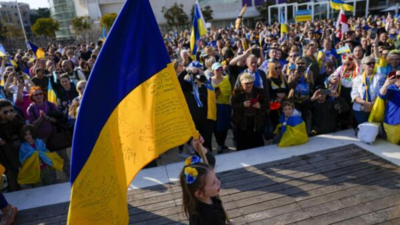
[ad_1]
Kyiv: On Sunday, Russia and Ukraine accused each other of violating the Easter truce announced by Russian President Vladimir Putin.
Ukraine President Voludmir Zelinski said that Russian forces continue to bomb and attack along the confrontation line despite Putin’s announcement of the sudden truce.
The 30 -hour truce that begins on Saturday evening to celebrate the religious holiday will be the most important stop in fighting throughout the conflict for three years.
But Zelinski accused Russia of maintaining its attacks on the confrontation line after the truce began.
The Russian Ministry of Defense said that it had “repelled” the attacks by Ukraine and accused Kiev of firing drones and shells, causing civilian victims.
“An increase in Russian bombing and the use of Kamikaz drones since 10:00 am (0700 GMT),” Zelinski said on Sunday, citing the Ukrainian Supreme Commander Olexander Serski.
He said earlier that the first six hours of the ceasefire witnessed “387 cases of bombing and 19 attacks by Russian forces”, with drones “used by the Russians 290 times.”
However, on Sunday morning, the Air Force in Ukraine did not report any drone attacks or missiles.
On Sunday morning, journalists at Agence France -Presse heard the explosions about ten kilometers (seven miles) from the confrontation line in eastern Ukraine.
Zelinski said that Ukraine will respond “in analog” to any attacks, accusing Russia “of trying to create a general impression of the ceasefire” with the continued isolated attacks.
The Russian Ministry of Defense said that “despite the announcement of the Easter truce, the Ukrainian units at night made attempts to attack” their positions in the Donetsk region “that was repelled.”
“444 times have been fully … our forces’ positions and carried 900 blows with drones,” said Ukraine.
The ministry said that these attacks left civilians “dead and wounded”, without providing details.
She insisted that her forces “noticed the accuracy of the ceasefire and remained on the front lines and the positions they had previously operated.”
Putin’s order to stop all the fighting during the weekend for Easter came after months of efforts by US President Donald Trump to obtain Moscow and Kiev to agree to the ceasefire.
On Friday, Washington threatened to withdraw from the talks if no progress is made.
Give peace an opportunity.
Putin announced the truce from 1800 (1500 GMT) from Saturday to midnight Sunday (2100 GMT on Sunday) in televised comments, saying it was motivated by “human reasons.”
While Ukraine was expected to comply, Putin said that Russian forces “should be ready to resist possible violations of Indian and provocatives by the enemy.”
Zelinski said that Ukraine would follow its example, and suggested that the armistice be extended until Sunday.
“Russia must fully comply with the conditions of a ceasefire. Ukraine’s suggestion to carry out and expand the ceasefire for 30 days after midnight remains on the table,” said Post Zelinski on Sunday.
Earlier, I suggested that “30 days could give peace an opportunity”-while he indicated that Putin has already refused a 30-day full ceasefire.
“It cannot be trusted in Russia”
Russia launched a wide range of neighboring Ukraine in February 2022.
The previous attempts of the ceasefire for Easter in April 2022 were not carried out, and the Orthodox Christmas was not implemented in January 2023 after both sides failed to agree on it.
In KYIV on Sunday, as Easter Bells, people expressed doubts about whether Russia would monitor the truce while welcoming Zelinski’s proposal to extend it.
“They have already broke their promise. Unfortunately, we cannot trust Russia today,” said Olga Grachova, 38 years old, who works in marketing.
“Our president has clearly said that if they announced the ceasefire for 30 hours, we will announce the ceasefire for 30 days. So let them go to it … so that this terrible war ends, so that our people, our soldiers and our children stop,” said Sergey Kluo, a railway worker.
But Natalia, a 41 -year -old doctor, said about Zelinski’s proposal for 30 days: “All we offer, unfortunately, only our offers. No one is responding to them.”
On the streets of Moscow, Yevgeny Pavlov, 58, did not think that Russia should give Ukraine a break.
“There is no need to give them comfort. If we press, this means that we must press to the end,” he told AFP.

